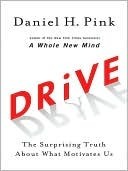More on this book
Community
Kindle Notes & Highlights
Read between
June 27 - July 20, 2022
“When money is used as an external reward for some activity, the subjects lose intrinsic interest for the activity,”
Routine, not-so-interesting jobs require direction; nonroutine, more interesting work depends on self-direction.
The best use of money as a motivator is to pay people enough to take the issue of money off the table.
“People use rewards expecting to gain the benefit of increasing another person’s motivation and behavior, but in so doing, they often incur the unintentional and hidden cost of undermining that person’s intrinsic motivation toward the activity.”4
Goals that people set for themselves and that are devoted to attaining mastery are usually healthy. But goals imposed by others—sales targets, quarterly returns, standardized test scores, and so on—can sometimes have dangerous side effects.
The problem with making an extrinsic reward the only destination that matters is that some people will choose the quickest route there, even if it means taking the low road.
Meaningful achievement depends on lifting one’s sights and pushing toward the horizon.
The essential requirement: Any extrinsic reward should be unexpected and offered only after the task is complete.
Human beings have an innate inner drive to be autonomous, self-determined, and connected to one another. And when that drive is liberated, people achieve more and live richer lives.


